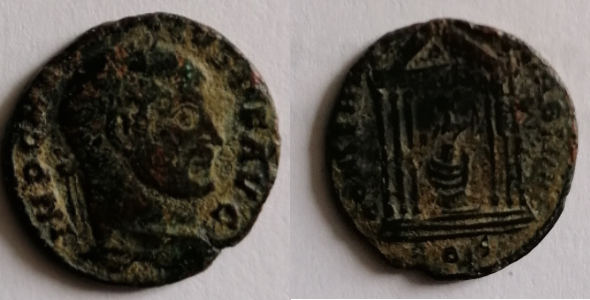Charmé in the gallo-roman era

Nummus Emperor Maxence 308-310 AD Collection Dominique Cirey
The town has very few traces of the Gallo-Roman era, unlike some of its neighbors. The remains of a Gallo-Roman villa had been updated at the end of the 19th century, in Bellicout, but nothing remains and we do not know from what century it dated, or even if artifacts (objects shaped by humans) were found on the site. Objects from the same period had been unearthed at La Touche and Ligné.
After the conquest by Julius Caesar, the Pax Romana (the 200 year old period of peace in the Roman Empire) settled in the area known as Roman Gaul, which quickly became one of the most prosperous provinces of the Empire. In 27 BC, Augustus founded the province of Gaul in Aquitaine, the first capital of which was Mediolanum Santonum (Saintes). In two centuries, the landscape of our region changes. The countryside becomes structured and modern cities begin to appear. Political unrest, repeated devaluations and constant inflation will get the better of this prosperity which had appeared to be neverending.
The barbarian invasions
We all remember names like Goths, Visigoths, and Ostrogoths (No, they are not just Hervé’s Captain Haddock’s insults in Tintin’s Adventures). Barbarus in Latin means someone who speaks neither Latin nor Greek and
expresses himself by « bar-bar », as one would say « gibberish » nowadays.
The words « invasions » and « barbarians » are both questionable. They evoke hordes of thousands of shaggy, dirty warriors clad in animal skins running amok over the Roman Empire. In reality it is more about migration, certainly accompanied by abuses and violence, rather than invasion. Of course, the barbarian smears his hair with rancid butter, while the Romans and Greeks prefer olive oil with which they smear the body, but it is not as animal like as it is presented to us.
At that time, according to Hippocrates, the cold gave the people of the north greater physical attributes to resist hand to hand attacks and that most of the blood rushes to the lower body (which is believed to explain the fertility of Scandinavian women).
They can therefore be injured, lose blood since they have more than the opponent. On the other hand, they have less blood in their heads … So the northerner is brave and courageous, but stupid (nice for ch’timis! People from the North of France!). By contrast, the southern man is intelligent, but cowardly. The Greeks and Romans, standing right in the middle, are therefore both intelligent and brave!
The arrival of these invaders were to have consequences on everyday life. It was at this time that the toga disappears from the wardrobe of the people, in favor of the breeches (trousers). It is indeed easier to run and to run away, in trousers than in a dress! Likewise, before these invasions no one was armed. From now on everyone will be armed. This is the end of the Pax Romana.
The Visigoths settle in the Charente
In 412 AD, the Visigoths entered Gaul and discovered a territory devastated by the invading barbarians. They
conquer a narrow strip of territory which goes, approximately, from La Rochelle to Toulouse. In 418, in exchange
for their collaboration to protect the borders (Le Limes), the Roman emperor Flavius Honorius allows them to
settle in Aquitaine. There they founded the kingdom of Toulouse, which extends from Loire to Gibraltar. And here
are the Visigoths, in the service of the emperor of the West, who adopt the way of Roman life and express
themselves in Latin. They will even abandon their funeral rites (cremation) in favor of Roman rites(burial).
Progress! Their king, Athaulf, marries the emperor’s sister. So here they are, brothers-in-law!
All of this does not please the Emperor, who still has to swallow the bitter pill.
Their presence in Gaul will end at the dawn of the 6th century, when Clovis I will win the battle of Vouillé(86) in
507, and in 508 when they will lose Toulouse, and will be pushed back beyond the Pyrenees. They will establish
their capital in Toledo. Septimanie (now known as Languedoc) will remain the only province of Gaul under their
domination.